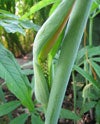
Mackenzie Caple
Project Coordinator
Academic Background
Univeristy of Michigan B.S. (Plant Biology/Chinese Studies)
Research

Paul Berry
Primary Investigator
Academic Background
B.S. Biology from Haverford College
M.A. and Ph.D. in Biology from Washington University in St. Louis
Research
My research interests are in plant systematics, including floristics, molecular phylogenetics, phytogeography, and bioinformatics. My work has mainly focused on the Neotropics, particularly the Guayana Shield, the Andes, and Brazil, as well as the upper midwestern United States. Plant groups of special interest are Euphorbiaceae (Euphorbia and Croton), Fuchsia (Onagraceae), and Rapateaceae. I am particularly interested in the study of "giant genera," those that are considered to contain over 500 species and have often been avoided because of their complex taxonomy, geography, and large numbers.
My newest research project stems from my interest in Euphorbiaceae, giant genera, and international collaborations. I am the principal investigator on a new National Science Foundation award in the "PBI" program (Planetary Biodiversity Inventories). The project is called "EuphORBia: a global inventory of the spurges," and it aims to produce a worldwide virtual monograph of the genus by the end of 2012, using modern bioinformatic tools, traditional field work and taxonomy, molecular phylogenetics, and floral developmental studies. Euphorbia contains over 2000 species and is distributed worldwide, but is most prominent in Africa, where many cactus-like succulents have evolved. We wish to make this a highly collaborative project, with training of students, postdocs, and participation of colleagues on all the vegetated continents.
U.S.-based or international students interested in joining the lab for Ph.D. studies on different aspects of the systematics of Euphorbia are encouraged to contact Professor Berry and apply to the Department of Ecology and Evolutionary Biology graduate program at the University of Michigan.
[bio from MICH]

Diarmaid Ó Foighil
Primary Investigator
Field of Study
Invertebrate evolution and systematics, malacology
Adademic Background
Diarmaid Ó Foighil obtained a B.Sc. (hons) in zoology from NUI Galway (Ireland) in 1981 and a Ph.D. in biology from the University of Victoria (Canada) in 1987. He was a postdoctoral fellow at the Friday Harbor Laboratories (University of Washington); Simon Fraser University (Vancouver, B.C.); and a research scientist at the University of South Carolina prior to joining the faculty at the University of Michigan in 1995. He has served as the president of the American Malacological Society and on the editorial boards of Evolution and Malacologia.
Research Interests
It is an exciting time to be a biologist. Ongoing theoretical and technical advances across broad areas of biological research are greatly expanding the scope of investigation for evolutionary studies and numerous classic questions concerning the origin and maintenance of biotic diversity are now being meaningfully tested for the first time.
The Mollusca are enormously diverse, have an excellent fossil record, and play central roles in almost all of the earth’s ecosystems. As a result, outstanding exemplar molluscan taxa can be targeted for most primary questions in the overlapping disciplines of evolution, systematics and biogeography. Although my background has been in marine systems, since moving to Ann Arbor I have also become very interested in freshwater and terrestrial taxa and presently have research projects on marine, terrestrial and freshwater taxa. See below a brief summary of our ongoing research project on endangered Pacific Island land snails.
Historical Phylogeny of Tahitian Partula, an Almost Extirpated Land Snail Fauna
NSF DEB-0425984
Partula hyalina and P. clara show enhanced resistance to the introduced predator Euglandina. Our results suggest that these two nominal Partula species represent a single polymorphic lineage stemming from a distinct Tahitian colonization event.
Jack Burch, Taehwan Lee and I are presently engaged in collaborative project with the Zoological Society of London on the conservation biology and systematics of this highly endangered malacofauna.
Thanks to Jack’s historical samples, we aim to reconstruct the evolutionary history of this fauna and provide a phylogenetic perspective to guide ongoing conservation efforts. See the popular Whyfiles article on this research.
[bio from UMMZ]

Daniel Fisher
Primary Investigator
-
Fields of Study
- Paleobiology
- Taphonomy
- Phylogenetic Inference
-
About
Professor Fisher's current research focuses on the paleobiology and extinction of mastodons and mammoths, elucidated by studies of growth increments and compositional (isotopic and elemental) time series sampled from their tusks and cheek teeth. Fieldwork associated with these projects involves many Pleistocene proboscidean sites in North America (especially the Great Lakes region) and in Siberia. North American occurrences include well preserved mastodon and mammoth skeletons, some showing evidence of human association (hunting, carcass processing). Siberian occurrences include permafrost-derived carcasses with extensive soft-tissue preservation, representing mammoths and other elements of the Mammoth Steppe fauna. Investigations of how teeth record details of animal physiology and life history are supported by studies of tooth formation processes in humans and other mammals. Additional projects have explored use of stratigraphic data in phylogenetic inference; digestive physiology of crocodilians; modes of growth of receptaculitid algae; comparative anatomy, skeletal crystallography, and phylogeny of stylophoran echinoderms; and functional morphology, phylogeny, and macroevolutionary patterns of horseshoe crabs.
-
Education
- Ph.D. Geology, Harvard, 1975
[bio from UMMP]

Janet Hinshaw
Collection Manager (Birds)
Adademic Background
Janet graduated from Earlham College, where she got her introduction to working in museums.
[bio from UMMZ]

Taehwan Lee
Collection Manager (Mollusks)
Field of Study
Molecular systematics and evolution of invertebrates with special emphasis on mollusks
Adademic Background
Ph.D. University of Michigan, Ann Arbor, Michigan. M. Sc. Sungkyunkwan University, Suwon, Korea. B. Sc. Sungkyunkwan University, Suwon, Korea.
[bio from UMMZ]



Mark O’Brien
Collection Manager (Insects)
Field of Study
Dragonflies of Michigan; Solitary bees and wasps; Great Lakes Region insect fauna
Adademic Background
I received my M.S. in Entomology from the State University of New York College of Environmental Science and Forestry in 1981. I have served as editor of the Great Lakes Entomologist and on the board of the Michigan Entomological Society. I have coordinated the Michigan Odonata Survey since 1997.
Websites
http://www-personal.umich.edu/~mfobrien/
[bio from UMMZ]

Richard Rabeler
Collection Manager (Vascular Plants)
Academic Background
Michigan State University,
Ph.D. Michigan State University,
M.S. Hartwick College, B.A.
Research
I specialize in the Caryophyllaceae. One of my major interests involves documenting occurrences of introduced members of this family, especially in the Great Lakes region and the southeastern United States. These plants are often much more widely distributed than suggested by floristic manuals. I am also interested in nomenclature and relationships of the genera and subfamilies that are included in the Caryophyllaceae.
I am active in the Flora of North America project, currently serving as Co-Lead Editor on Volume 17 with Dr. Craig C. Freeman of the University of Kansas. I am also Past-President of the Society for the Preservation of Natural History Collections.
[bio from MICH]

Anton Reznicek
Curator (Vascular Plants)
Research
Systematics and evolution of Cyperaceae, especially Carex, with emphasis on a multi-level approach concentrating on several aspects including development of new characters useful in systematics, monographic studies of major groups, sectional classification and nomenclature, and processes and patterns of evolution. A major present focus is the neotropics, especially Mexico.
Phytogeography of the northeastern North American flora, concentrating on the Great Lakes region. Primary interests here are plant migration and colonization, origin and persistence of relict plant species and communities, and wetland vegetation dynamics, especially of the Great Lakes shorelines.
Conservation of the Great Lakes region flora.
[bio from MICH]

Greg Schneider
Collection Manager (Herpetology)
Field of Study
Preservation, care, and management of museum collections and associated data.
Adademic Background
Greg Schneider received his BS (Biology) from California State College, Stanislaus in 1980 and his MS (Biology) from the University of California, Santa Barbara in 1986. He has been employed by the UMMZ as the Collections Manager of Reptiles and Amphibians since 1986.
[bio from UMMZ]

Cody Thompson
Collection Manager (Mammals)
Field of Study
- Evolutionary patterns and processes of mammalian diversity
- Ecological and evolutionary implications of hybridization in mammals
- General natural history of mammalian species
Adademic Background
- Ph.D., Texas Tech University
- M.S., Fort Hays State University
- B.A., University of Northern Iowa
Research Interests
The main focus of my research centers on the patterns and processes of mammalian diversity. In particular, I have concentrated on the evolutionary and ecological implications of hybridization in mammals. My dissertation research focused on studying the hybrid zone between two species of ground squirrel (i.e., Ictidomys parvidens and I. tridecemlineatus). Through genetics (i.e., gene sequencing and AFLPs) and ecological niche modeling, I answered questions regarding the historical biogeography of these species, current levels of hybridization, and the role the environment has played in determining locations of contact and subsequent potential for hybridization. Papers resulting from my research are in various stages of publication. Currently, I am in the process of developing a follow-up project to explore transcriptomes in the two ground squirrels to find genes potentially involved with genetic isolation and speciation.
Similarly, my Master’s research focused on identifying and characterizing the contact zone between the northern short-tailed shrew (Blarina brevicauda) and the Elliot’s short-tailed shrew (B. hylophaga) in southwestern Iowa and northwestern Missouri. This study involved intensive fieldwork, field karyotyping, and AFLPs, which has led to the publication of three papers. A follow-up project to evaluate the correlation between karyotypic variation and population-level genetic differences within the genus Blarina is presently being planned.
My other research foci include systematics, taxonomy, and the general natural history of mammals. These research projects have stemmed from collaborative efforts with colleagues. Projects have included the molecular evolution of the Rpb3 gene in pocket gophers; invasive ecology of the gray squirrel; natural history of Mexican woodrats; dietary analysis between the bobcat and the ocelot; hantavirus prevalence in urban areas; and the distribution of the hispid cotton rat. Current projects include an evaluation of the historical biogeography of the pocket gophers (genus Geomys). In addition, we are in the planning stages of rewriting the Mammals of Iowa, which will be written for more of a general audience. Additional projects are in development and underway.
Websites
http://codythompson51.wordpress.com
[bio from UMMZ]

Beverly Walters
Collection Manager (Vascular Plants)
My primary activities at the Herbarium include managing the Michigan Flora Online website, specimen record and curatorial data management, and maintaining the integrity of the vascular plant collections for research purposes. In addition, I participate in special projects, such as facilitating access to images and data of our most important ‘type’ collections and, most recently, botanical field surveys of the properties managed by Matthaei Botanical Gardens and Nichols Arboretum.
Academic Background
B.S., Michigan State University, Botany
[bio from MICH]

